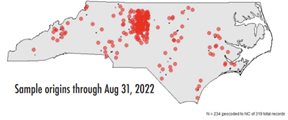February 2023: Nabarun Dasgupta
Scientist and Gillings Innovation Fellow, UNC Injury Prevention Research Center
Addressing the Opioid Crisis and Identifying Solutions
“Overdose deaths are at historical highs (100,000+ annually) in the US. The problem is we don’t know exactly what’s killing people. We only find out what’s in street drugs when it’s too late – when people are either arrested or dead.”
Nabarun Dasgupta

Can you provide a little background on how the drug checking service works and what influenced you to create it?
We have analytical chemistry tools on campus now available to be used to monitor the street drug supply in real-time. During the pandemic, I was sitting in line at a drive through COVID PCR test and thought we could do that with street drugs instead of a nasal swab. We designed our kit to look a lot like the COVID PCR kit: it has a swab and a vial with liquid, like a solvent. We send these kits to health departments and frontline public health harm reduction programs around the state and country. A person can take a scoop of the drug sample or a swab of an empty bag and send it back to us on campus, and we run it on a Gas Chromatography Mass Spectrometer (GCMS). We report the results the same day the sample is run via a QR code sent to the person who provided the sample. We also make data sets and dashboards to show these trends in real-time and that information has been really fascinating.
What is the value of this research to citizens across North Carolina?
 One of the things that differentiates this project from others that I’ve worked on is that it’s not a research project – it’s a service. Our primary objective is for it to be a public service that is a benefit to public health in NC. With the Collaboratory funding, we are able to offer our service, for free, to any public health program, health department, or clinic in NC. We are one of the only states where we have a decent representation of the statewide drug supply in real-time. We have pilot money from a private foundation and the Collaboratory funding really helps us take the proof of principle to expand it to whichever program needs it in NC. Before the funding we had eight programs or so, we are now up to 20. The reaction from NC on-the-ground public health groups has been super positive.
One of the things that differentiates this project from others that I’ve worked on is that it’s not a research project – it’s a service. Our primary objective is for it to be a public service that is a benefit to public health in NC. With the Collaboratory funding, we are able to offer our service, for free, to any public health program, health department, or clinic in NC. We are one of the only states where we have a decent representation of the statewide drug supply in real-time. We have pilot money from a private foundation and the Collaboratory funding really helps us take the proof of principle to expand it to whichever program needs it in NC. Before the funding we had eight programs or so, we are now up to 20. The reaction from NC on-the-ground public health groups has been super positive.
Can you provide any evidence, anecdotal or statistical, of the benefit the current drug checking service has provided?
Helping people start drug treatment and helping doctors know or figure out in an evidence-based way how to modify their clinical protocols to better treat addiction is important. A lot of people working in opioid addiction are struggling with how to get people on medications that treat their addiction. The strong suspicion is that it’s because the drug supply is so variable that they’re going to have to come up with a different cocktail of medications. What’s been happening is people will be ready to quit, have their insurance together, have all of the mental work done to get to the point where they’re in front of a doctor, and the doctor has one standard clinical protocol that is always used and most people fail that induction.
Figuring out ways to get people to stay on treatment for more than a week is really important. Part of that is making them physically more comfortable – with the xylazine in the drug supply, if you stop taking it, it creates a terrible rebound hypertension where the blood pressure becomes so high that it causes anxiety and hospital visits. So, if we know that that’s in the drug supply, on a medical level we can provide additional blood pressure-controlling medications to help during that transition and their opioid therapy as well.
